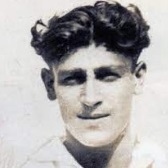 2022 | ||||||||||||||||||||||||||||||||
| Personal information | ||||||||||||||||||||||||||||||||
|---|---|---|---|---|---|---|---|---|---|---|---|---|---|---|---|---|---|---|---|---|---|---|---|---|---|---|---|---|---|---|---|---|
| Full name | Lucas Zoilo Saldombide Astol [1] | |||||||||||||||||||||||||||||||
| Date of birth | October 26, 1903 | |||||||||||||||||||||||||||||||
| Place of birth | Santa Lucía, Uruguay | |||||||||||||||||||||||||||||||
| Date of death | December 4, 1981 (aged 78) | |||||||||||||||||||||||||||||||
| Position(s) | Striker | |||||||||||||||||||||||||||||||
| Senior career* | ||||||||||||||||||||||||||||||||
| Years | Team | Apps | (Gls) | |||||||||||||||||||||||||||||
| 1923–1926 | Montevideo Wanderers | |||||||||||||||||||||||||||||||
| 1927–1934 | Nacional | 182 | (45) | |||||||||||||||||||||||||||||
| International career | ||||||||||||||||||||||||||||||||
| 1922–1928 | Uruguay | 13 | (3) | |||||||||||||||||||||||||||||
Medal record
| ||||||||||||||||||||||||||||||||
| *Club domestic league appearances and goals | ||||||||||||||||||||||||||||||||
Lucas Zoilo Saldombide Astol (October 26, 1903 [2] [3] [4] (March 18, 1905 according to other sources [5] [6] ) - December 4, 1981) was a Uruguayan footballer. [7] He was part of the team that won the first ever World Cup in 1930 for Uruguay, but he did not play any matches in the tournament. He was a club player of Montevideo Wanderers and Nacional.